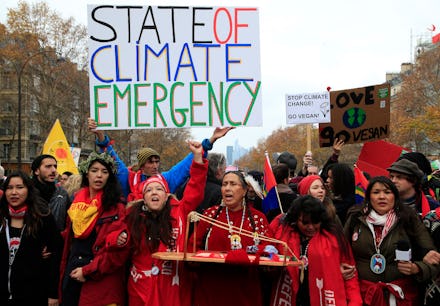Here's How Fossil Fuels Are Hurting the Environment and Why Renewable Energy Is the Answer

In December, the United States, along with other 194 countries, agreed to adopt the Paris climate agreement, which seeks to limit the adverse effects of climate change by reducing global warming to "below 2°C". In order to fulfill the agreement, the U.S. must reduce its greenhouse emissions markedly by 2020, the year the agreement goes into effect.
The burning problem: But in order to combat the devastating effects of climate change, the burning of fossil fuels must be addressed. "Over the last century, the burning of fossil fuels like coal and oil has increased the concentration of atmospheric carbon dioxide," according to NASA, which in turn, has contributed to the warming of the planet.
Read more: How Can We Stop Global Warming? 4 Changes We Can Make to Help Us Now
According to Energy.gov, Fossil fuels are non-renewable resources — oil, coal and natural gas, which are remnants of prehistoric animals and plants that were buried under layers of rock. "Today, fossil fuel industries drill or mine for these energy sources, burn them to produce electricity, or refine them for use as fuel for heating or transportation," the website reads. "Over the past 20 years, nearly three-fourths of human-caused emissions came from the burning of fossil fuels."
However, a recent study from Bloomberg New Energy Finance that examines 2015 developments in energy, found that in 2015, renewable energy became the "biggest source of new power added to U.S. electricity grids", to the tune of 68%. According to the Sustainable Energy in America Factbook, clean power overtook fossil fuels for a second year in a row.
Moving forward: Renewable energy, a form of energy that cannot be exhausted, includes sunlight, geothermal heat, wind, water, biomass, and more. Michael Liebreich, chairman of the advisory board at Bloomberg New Energy Finance, seems to believe that renewable energy is the future.
"Wind and solar power are now being adopted in many developing countries as a natural and substantial part of the generation mix: they can be produced more cheaply than often high wholesale power prices; they reduce a country's exposure to expected future fossil fuel prices; and above all they can be built very quickly to meet unfulfilled demand for electricity," Liebreich, who founded New Energy Finance in 2004 before it was acquired by Bloomberg, said in a press release. "And it is very hard to see these trends going backwards, in the light of December's Paris Climate Agreement."
Colleen Regan, a Bloomberg New Energy Finance analyst who focuses on the trends of North American power markets echoes Liebreich's sentiments. "This is a long-term trend," Regan told Bloomberg Business. "System costs have really come down for renewables, which makes the case for installing them a lot stronger."
A big payoff: The amount of investment needed each year to ensure that the globe remains under 2 degrees Celsius is "completely manageable," according to the Huffington Post. "The report also found that the incremental amount of investment needed every year over the next 15 years to keep the U.S. and the rest of the globe below 2 degrees Celsius of warming is less than the current annual volume of U.S. auto loans," HuffPost business reporter Ben Walsh wrote.
According to NASA, about 97% of published climate scientists believe that climate change trends are most likely caused by human interaction with the environment. With the majority of climate change scientists in agreement, Bill McKibben, founder of the environmental justice organization 350, also believes that renewable energy is the only way.
"We have to keep 80% of the fossil-fuel reserves that we know about underground. If we don't — if we dig up the coal and oil and gas and burn them — we will overwhelm the planet's physical systems, heating the Earth far past the red lines drawn by scientists and governments," McKibben wrote in Yes! Magazine. "It's not 'we should do this,' or 'we'd be wise to do this.' Instead it's simpler: We have to do this."